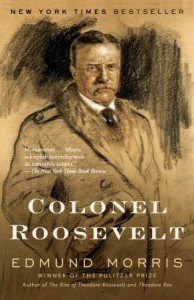Currently reading
Colonel Roosevelt

Edmund Morris' final volume in his biographical trilogy of Theodore Roosevelt, Colonel Roosevelt, is a fantastic conclusion about this colossus in American history. Morris' writing is an easy read and his research top notch thus making this a wonderful book for students of history of any age. Though like the previous volume of this trilogy, Theodore Rex, the book seems to be stylistically divided in two with the first stronger than the second.
Beginning with a wonderful prologue describing T.R.'s African safari, the first half Colonel Roosevelt shows Roosevelt seemingly having all the power and prestige of the Presidency without being in office. His 1910 tour of European, including being the U.S. special ambassador at Edward VII's funeral, looks like a victory tour even now like it seemed to be then. However, upon his return home Roosevelt starts to become disillusioned with this chosen successor William Howard Taft. This disillusionment turned into disgust and Roosevelt aimed to unseat Taft only for the Republican establishment to prevent his nomination in 1912 resulting in a party split. Even acknowledging defeat Roosevelt campaigned hard to score the best showing every by a third party candidate, showing up Taft in the process.
After 1912 not only does Roosevelt seemed to decline, but so Morris stylistic prose. The second half of the book begins with the South American expedition that almost cost him his life, however it relating what happened Morris seems to give the reader an overview of what it about to happen to his subject and the style of the book starts to feel melancholy. While Morris shows Roosevelt's resolve to prepare the country for entry into The Great War, he also shows how Roosevelt was losing is once famous balancing between extremes. The death of Quentin heavily foreshadowed almost in league with the stylistic change, Roosevelt's own death.
The epilogue of Roosevelt's funeral followed by the course of his place in history along with short biographies on his wife and family, is welcome stylistic change as Morris looks over the course of nearly 90 years to see how Roosevelt's 60 year life is viewed and did so in great effect.
After the first two volumes of this trilogy it was hard for me to give this book only 4 stars, however the second half of Colonel Roosevelt saw seemed so much of a disconnected with the first half and the epilogue that it was jarring. This stylist change could have been all in my own head as I knew where Roosevelt's journey was taking him, but there did seem to be change especially in comparing the second half to the epilogue. However, as I stated in the opening paragraph Morris writing and his research are first rate and I can not recommend this final volume of his T.R. trilogy enough.





